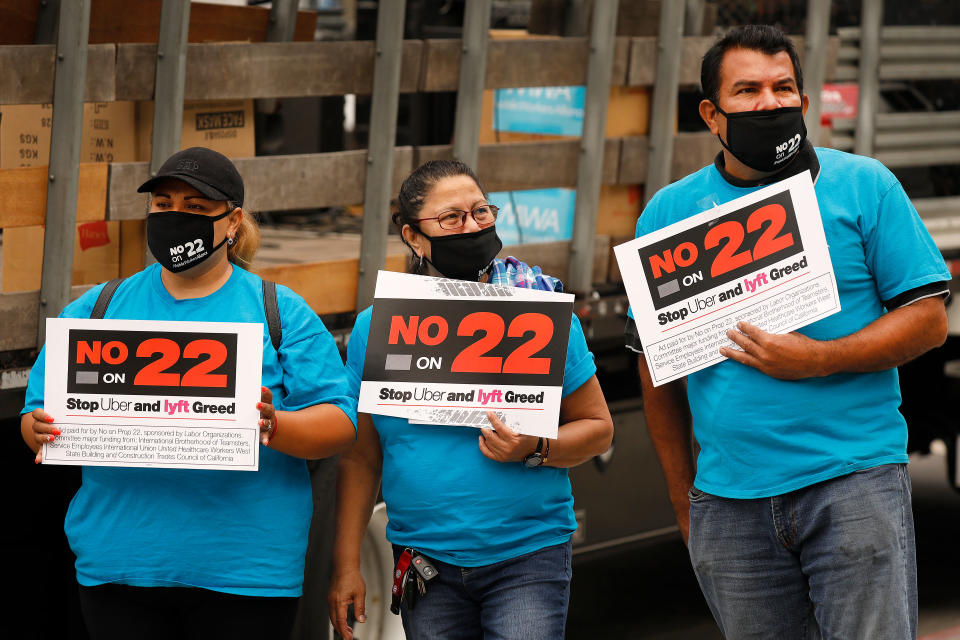Uber, Lyft, and gig companies win big after Prop 22 passes in California

Our mission to help you navigate the new normal is fueled by subscribers. To enjoy unlimited access to our journalism, subscribe today.
California voters have spoken: Gig companies like Uber, Lyft, and DoorDash will be allowed to continue classifying their workers as independent contractors by providing them with a few additional benefits.
The ballot initiative called Prop 22 passed with a 58% majority, or 6.7 million votes, supporting the measure, according to the latest results reported at noon ET on Wednesday. The initiative exempts these companies from a recent state law that would require them to classify their workers as employees. Instead, Prop 22 will guarantee gig workers a minimum hourly wage, new health benefits for workers who log a minimum of 15 hours, and medical and disability coverage for injuries and illnesses on the job—benefits that will be new to many gig workers but still short of what they would receive as employees.
“The gig economy companies will be breathing a sigh of relief tonight,” said Tom White, analyst at D.A. Davidson. “The gig economy companies realize there needs to be more of a middle ground, so they’ll be stepping up.”
Prop 22, which was funded and developed by the companies that benefit from gig workers, was posed as an alternative to Assembly Bill 5, a bill that was signed into law and took effect in January, making it harder for some companies to classify their workers as independent contractors versus employees. The decision maps a less costly course for gig companies, whose business models were recently threatened by AB 5.
Following the results, Uber sent an email to its drivers suggesting that “the future of independent work is more secure” now that the measure has passed. The Yes on 22 campaign, supported by the gig companies, also lauded the win.
“Prop 22 was successful because it represented the best interests and preferences of hundreds of thousands of app-based drivers across the state,” reads a statement from the campaign. “Tonight’s victory clearly indicates this solution was preferred by a majority of drivers, customers, and voters, and a model for preserving the flexibility app-based ride-share and delivery drivers need and want.”
But critics, including a group of drivers advocating for workers’ rights called Gig Workers Rising, argue that the proposition doesn’t do enough for drivers and deliverypeople. The group previously called Prop 22 a “corporate power grab,” keeping workers from health care, fair wages, and workers compensation.
“The victory of Prop 22, the most expensive ballot measure in U.S. history, is a loss for our democracy that could open the door to other attempts by corporations to write their own laws,” a statement from Gig Workers Rising reads. “When corporations spend hundreds of millions of dollars to write their own labor laws even after our elected officials and public institutions have, numerous times, rejected them, that is a loss for our system of government and working people.”
White of D.A. Davidson said that though the decision provides some welcome relief to companies, it will still likely drive up the costs of riders’ fares. In order to cover the new benefits of their California employees, the companies will likely have to pass on some of the costs to customers, he said. However, it could also provide a road map for other states that may have considered imposing similar new laws on gig companies. If that happens, riders can expect higher prices in states where drivers get more benefits.
“Over time, I think it’s inevitable that you are going to see more of a middle-ground treatment of gig economy workers,” White said. “Somewhere that falls between AB 5 and what we historically think of as an independent contractor.”
The vote in favor of Prop 22 removes Uber and Lyft from a sticky situation they were facing in the California courts. In August, a California superior court judge granted a preliminary injunction after Uber and Lyft did not reclassify their drivers following the implementation of AB 5. Then last month, the companies lost their appeal and were given about 60 days to request a review from the California Supreme Court.
The companies previously argued that if Prop 22 hadn’t passed, they would’ve had to eliminate “thousands” of jobs and permanently shut down service in many areas to account for the higher costs associated with paying employees. But critics say that for far too long, the companies have unfairly compensated their workers and that Prop 22 only allows that to continue.
More politics coverage from Fortune:
USPS update: The latest on how absentee ballots are being counted in swing states
Biden’s Arizona win makes Pennsylvania less crucial
Uber, Lyft, and gig companies win big after Prop 22 passes in California
This nail-biter election generated the highest U.S. voter turnout rate in 120 years
How Trump can and can’t use the courts to shape the election
This story was originally featured on Fortune.com

 Yahoo Finance
Yahoo Finance 